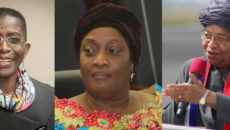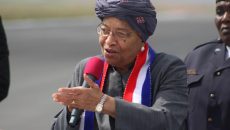As an American aid worker in Liberia who did quite a bit of writing on the side, I heard a number of complaints by Liberians about the quality of international journalism on the country.
These grievances were aired frequently and vigorously from numerous sources. Former ministers of information, presidents of the Press Union of Liberia, and others all noted that by and large, international coverage of Liberia left much to be desired.
I’m not sure how well I understood the complexities of Liberian society after a year and a half in the country, but a recent “Lunch with the FT†piece, featuring an interview of President Ellen Johnson Sirleaf by David Pilling, the paper’s newly minted Africa editor, stands out as a sterling example of the failure of international journalists to capture the complexity and diversity of influences that shape Liberian society.
The piece begins by focusing on Sirleaf’s “southern American drawl,†not a usual point of reference for a Harvard graduate. This sets the tone as the article is riddled throughout with gross generalizations and a sprinkling of factual errors.
I’ll begin with the outright errors in what many consider to be the world’s most prominent business publication.
The piece recycles a line that I’ve seen elsewhere, but which is not grounded in any semblance of fact. Pilling declares that Sirleaf was “one of only four cabinet members to be spared†following the bloody 1980 coup that occurred shortly after she was named finance minister.
While I do not have the precise figures at my disposal, at least three of Tolbert’s cabinet members retained their positions in the early days of the new government (the Ministers of Health, Public Works, and Development).
This excludes a number of other prominent survivors, such as Sirleaf’s own brother-in-law, who was Minister of Youth and Sports at the time of the coup. Elwood Dunn, Tolbert’s Minister of State for Presidential Affairs who subsequently became one of Liberia’s most celebrated academics, and the Minister of Defense, James Gbarbea, are two other survivors.
Pilling also notes that the 2005 elections were overseen by “US peacekeepers brought in to help enforce a ceasefire and re-establish democratic rule.†While I have heard many Liberians bitterly complain about the refusal of US forces to intervene to stop the bloodshed of the war, the presence of US peacekeepers during the 2005 elections is news to me.
Aside from these errors, Pilling also brings out the tired tropes and simplification of writing on Liberia for non-specialist audiences. These include the aforementioned reference to southern influences and the observation that Liberia was “founded by emancipated slaves from America†and was “run by and for Americo-Liberians†since 1822.
Liberia was created by the American Colonization Society, a white-governed entity founded in Washington, DC and which directly administered the territory through white governors until 1841.
J.J. Roberts, the first non-white governor and Liberia’s founding father, was never a slave. The non-southern influences on Liberia were not insignificant, particularly given the extent to which the settlement of blacks was confined to the US South in the early 19th century.
The two Presidents that followed Roberts were born in Maryland, a state more aligned to the mid-Atlantic than the South. Other presidents were rooted in the Caribbean. Â Only one foreign-born Liberian President, James Smith, who emigrated from South Carolina and held office for just a few months following the death of the elected incumbent (from Ohio), could be considered as hailing from the deep South.
State colonization societies in Massachusetts and New York helped found Liberia College, one of the earliest western style institutions of higher education in Liberia. Its early professors included Martin H. Freeman, a black man from Vermont who graduated from Middlebury College and was never a slave. Another professor of Liberia College and a prominent Liberian diplomat was Edward Blyden. Blyden was born in the Danish West Indies and was never a slave. John Brown Russwurm, raised in Maine and a graduate of Bowdoin College in that state was the editor of Liberia’s first newspaper.
Liberia is seen as a backward nation blighted by war. In the United States, the American South is perceived as being economically depressed, uneducated, and unable to move on from the consequences of the American Civil War. Stylistically, it plays well for journalists to link the two. In reality, many of Liberia’s American born presidents hailed from states that never joined the Confederate States of America.
While many of Liberia’s early 19th century leaders were light-skinned, Pilling curiously asserts that when Sirleaf grew up in Liberia in the 1940s and 50s she “was considered part of the lighter-skinned ruling elite.†This is again an oversimplification.  The president throughout much of Sirleaf’s youth was William Tubman, who the US Embassy saw fit to describe as “very black†in a cable following his election in 1943.
These nuances are not simply splitting ends.
Pilling’s writing, like that of most western journalists on Liberia, places the blame for Liberia’s problems firmly on the historical errors of the Americo-Liberian elite and the vengeful retribution of the exasperated indigenous masses. There is no consideration of the institutionalized racism that hampered Liberia throughout much of its existence. Pilling refers to “the freed slaves who came to Africa only to impose a form of quasi-slavery of their own.â€
Conversely, discourses on Liberia rarely point out the irony of supposedly enlightened American planters freeing their slaves on the condition that they relocate to a country they knew nothing of. The history of Africa is not replete with altruistic colonizers bringing civilization, but of foreign invaders who committed genocide, chopped off limbs, and denied educational opportunities.
Pilling notes that former Liberian President Samuel Doe oversaw Liberia’s “descent into a murderous hell,†but there is no recognition that he was fueled by the unprecedented amount of aid the US government allocated to his administration – he was the recipient of more aid in 5 years than all other Liberian administrations combined.
Pilling is so dismissive of Liberia that he doesn’t even mention the name of the restaurant where they shared lunch. In a quick review of five other “Lunch with FT” pieces, all identified the name of the dining establishment in the opening paragraphs.
Pilling does ask Sirleaf some provocative questions. He pushes her on allegations of nepotism and her tolerance of corruption. He enquires about her popularity being greater abroad than at home.
Unfortunately, with the opportunity to place Liberia’s woes in a more historically appropriate context before a mass audience, he embraces the stereotypes and loses all credibility. He even includes an awkwardly articulated quote on the contemporary influences of Liberian history from Sirleaf that affirms his perspective – “that beginning has shaped some of our values, even today. The ostentatious lifestyle. A lot of socialization. The Antebellum South.â€
Binyavanga Wainaina has told us How to Write About Africa. We all know that Africa is not a country, so perhaps someone has outlined a country specific template for Liberia. If not, then Pilling and other international journalists are revealing the extent to which prejudice lingers by drawing from the same playbook.



